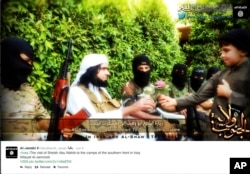Cyber-driven terrorism has changed how groups like Islamic State reach out across the world to trigger attacks, particularly among younger Internet users who are social media and technology mavens.
“We have not seen a terrorist threat like this before,” said John Carlin, assistant attorney general for national security at the U.S. Department of Justice.
Carlin said that over the past 18 months, there have been more than 70 cases linked to foreign terrorist fighters.
In 2015 alone, there were more than 10 cases in which Islamic State extremists called upon their targets to kill someone at home if they could not travel overseas.
More than half of the defendants are under 25, and a third are 21 or younger, Carlin said this week at a Washington conference sponsored by Defense One, a news and analysis website that focuses on defense and national security issues.
“We know the terrorists are particularly targeting, and having success targeting, young people, including children, with their radicalizing message,” he said.
Carlin said there did not appear to be a common demographic or ethnic thread. “The common connection we’re seeing is in almost every case a tie to social media, and because the people who use social media the most tend to be young, I think that’s why we’re seeing our cases trend younger and younger,” he said.
Carlin said the solution lies in preventing terrorists overseas from directly contacting youths in the United States.
Different view
But Richard Stiennon, author of the book Surviving Cyberwar, said social media are not the problem.
“We’ve always had youth susceptible to influence from bad elements — drugs, gangs,” Stiennon told VOA. The Internet is just spreading the phenomena faster, he said. “Terrorists are late to the game but jumping right in, so the problem will grow as fast as other Internet things grow.”
The officials said the ability of terrorist groups to sit inside one country — such as IS in Iraq or Syria — and communicate with extremists around the world to either carry out attacks or help others do so, is unprecedented.
“That’s a new paradigm within the terrorist model. I would call it a significant innovation in the terrorist playbook,” agreed Nick Rasmussen, director of the U.S. National Counterterrorism Center.
The officials cite the case brought in June against Ardit Ferizi. Ferizi allegedly hacked into a U.S. company, stole personal identifying information, including data on some 1,000 U.S. military personnel and their families, and provided that information to IS hacker Junaid Hussain.
The terrorist group, in turn, posted that information on Twitter, calling upon its sympathizers to kill the individuals whose personal information it had put online.
“This shows the threat we face today,” Carlin said. “We have Ferizi, who is a guy from Kosovo, who goes to Malaysia to hack into a U.S. company to provide the information to a British guy, who is in Raqqa, Syria, to use for a terrorist group, who then projects it back into the United States, using U.S. technology and essentially free services, for these people to be killed.”
Ferizi has been arrested and his extradition to the United States is pending. Hussain, a British national, was killed in a U.S. airstrike.
Stiennon said communications technology has been creating major shifts in the world. He pointed out that Facebook alone now has more than 1 billion active users per month.
“There are going to be things happening that no one predicted,” he warned. “This is a way of life.”












